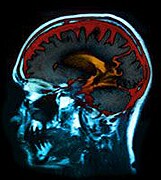
WEDNESDAY, Sept. 2, 2015 (HealthDay News) — People with type 2 diabetes may be more prone to developing the brain “tangles” associated with Alzheimer’s disease, a new study suggests.
The study found that people with type 2 diabetes had a greater accumulation of brain tangles — even if they were free of dementia or milder problems with memory and thinking.
The findings, reported Sept. 2 in the journal Neurology, hint at one explanation for why people with type 2 diabetes have an increased risk of Alzheimer’s disease.
That is, type 2 diabetes may cause brain abnormalities that pile on to other degenerative changes that ultimately lead to dementia, explained study senior researcher Dr. Velandai Srikanth, a geriatrician at Monash University in Melbourne, Australia.
However, he said, this study shows only a correlation between type 2 diabetes and brain tangles. It’s not clear whether the type 2 diabetes is the cause, since there are many other factors to consider.
Obesity is one example, Srikanth said. People with type 2 diabetes are often obese, and other research has linked obesity to a greater accumulation of brain tangles.
On the other hand, diabetes might directly contribute — by causing chronically high blood sugar levels, for instance. But more research is needed to clarify the cause, Srikanth said.
Studies have found that people with type 2 diabetes have nearly twice the risk of developing Alzheimer’s or other forms of dementia as people without diabetes, background information in the study noted. That could partly be due to their higher rates of stroke and narrowing in the arteries supplying blood to the brain, according to Srikanth’s team.
But it could also be related to degeneration in brain tissue. In an earlier study, the current study’s researchers found that older adults with diabetes tended to show more brain “shrinkage” than those without the disease.
The new findings are based on 124 older adults with type 2 diabetes and almost 700 without the disease. Some had Alzheimer’s, others had milder problems with memory and thinking, and others were mentally sharp.
All of the study participants underwent MRI brain scans, and about half had samples taken of their cerebrospinal fluid to measure levels of beta-amyloid and tau — proteins that make up the plaques and tangles seen in Alzheimer’s-affected brains.
Overall, the study found, people with diabetes had more thinning in the brain’s cortex, the area with the highest concentration of nerve cells. People with type 2 diabetes also had higher levels of tau protein in their spinal fluid — which indicates more tangles in the brain, the study found.
An Alzheimer’s researcher who reviewed the study called it “important.”
“It clearly shows that type 2 diabetes is associated with an increase in [tau] and a decrease in cortical thickness,” said Kalipada Pahan, a professor of neurological sciences at Rush University Medical Center in Chicago.
The implication, according to Pahan, is that preventing or better controlling diabetes could be one way to combat tangle formation in the brain.
But for now, it’s not clear why diabetes is connected to tau buildup.
“Several factors may play a role,” Srikanth said.
Chronically high blood sugar is one possibility, he noted. Another is low-grade inflammation throughout the body — a state that is seen in diabetes and other chronic health conditions.
Obesity could be part of the puzzle, too, Srikanth said. There is “an interesting body of evidence” tying obesity to tau, he explained.
Just this week, a U.S. study in Molecular Psychiatry reported a link between middle-age obesity and earlier Alzheimer’s onset. Brain autopsies also revealed that Alzheimer’s patients who’d been heavy at age 50 had more brain tangles than those who’d been at normal weight.
“Type 2 diabetes cannot be the only mechanism for tau pathology,” Pahan said. “Obesity, abnormal fat metabolism and many other health issues may lead to tau pathology via different pathways.”
He also noted that diabetes boosts a process called “glycation,” where sugar molecules latch onto proteins.
“It’s possible that glycation of an important brain protein is involved in tau buildup,” Pahan said. But that, he added, has yet to be shown.
More information
The Alzheimer’s Association has more on Alzheimer’s and the brain.
Copyright © 2026 HealthDay. All rights reserved.

